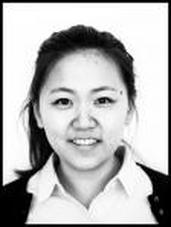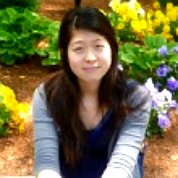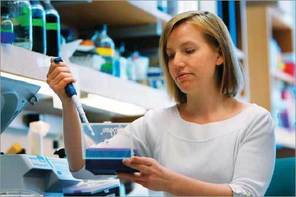|
As an undergraduate, one of the best things that a lab can give you is good mentorship, whether it is from a principal investigator (PI), a graduate student, or a postdoctoral fellow. After joining the Wagers Lab, I was lucky enough to be paired with Juhyun (Julie) Oh. Julie is currently a rising G4, meaning she’ll be entering her fourth year of graduate school this upcoming academic year. Julie is in the Biological and Biomedical Sciences (BBS) program through Harvard Medical School and specializes in the subfield of Translational Medicine. The undergraduates in the Wagers Lab joke that our PI, Amy Wagers, is an incredible matchmaker. Each match between grad student/postdoctoral fellow and undergraduate has gone exceedingly well, and I can’t say any less about my match with Julie! This past week, I was able to interview Julie about her experiences with research. I found her responses to be both encouraging and enlightening, and hope you may glean some kernels of wisdom from them as well!  Juhyun "Julie" Oh, G4 in the Wagers Lab. 1. Introduce yourself! How did you come to be where you are today? I was born in California, where my father completed his MBA. We actually don’t have any scientists in my family. My grandfather is a physician, but no scientists. When I was six, my family moved to Korea, where I attended school until college. So, I consider myself to be very Korean [laughs]. In Korea, I attended an international boarding school which had a program to prepare students to attend college abroad. There, we didn’t follow the Korean educational system, but instead, studied for the SATs and APs; in a very intense, Korean way, of course. That’s how I ended up at MIT for my undergraduate degree. In high school, we were forced to choose a subject to study more in depth. I chose biology since I’ve liked biology since middle school when I first learned about genetics. When I was admitted to MIT, I decided to come to the US for Campus Preview Weekend (CPW) all the way from Korea in April. I ended up liking MIT and Boston. For graduate school, Harvard has the best biomedical program in the nation, with five hospitals associated with it. I was very lucky to get in. 2. What made you decide to pursue graduate school? I started lab research relatively early. During high school, I was in a lab every summer and winter break. I liked it so I decided to continue to pursue research when I came to MIT. At MIT, I studied the mediating factors between the cell-cell interactions that allowed hepatocytes (liver cells) and fibroblasts (structural cells) to flourish together in vitro, in a cell culture dish. It was after a full summer of none of my lab experiments working, that I decided to pursue research for a living. I changed the conditions of the procedures; talked to my postdoc but nothing worked. In the fall semester, I was still trying to do the same thing. It was so frustrating. That November, I finally got one experiment to work. I was really, really happy on that day [smiles]. After that, everything worked pretty well. That difficult experience taught me the process of research. Even if something doesn’t initially work, it will eventually work itself out. I understood the bad and good times that will inevitably happen if you pursue a PhD. Through this reality check, I realized I didn’t mind the difficulties of research. The one thing I regret is that I didn’t get to explore much of anything else in college besides research. While I was well-prepared for graduate school, I didn’t get a chance to explore other careers. I guess that’s the opportunity cost. 3. What is the best thing about graduate school? Flexibility. You don’t have to wake up early in the morning [Side note: Julie is notorious for coming into lab late; around 11:00am]. However, that means you have greater responsibility when dealing with your time. One senior grad student told me when I was in my first year: If you work twelve hours each day, seven days a week, you will graduate in five years. If you work eight hours, five days a week, you will graduate in six or more years. So, you have to put a significant amount of time into research. Still, it’s flexible, and that’s a really good thing. 4. How about the worst thing about graduate school? I’m still in school. I have a lot of friends who are doing IB (investment banking), and I definitely feel a distance between myself and them. Sometimes, it feels like I’m missing out on something as my banker friends develop in a totally different environment, becoming adults. 5. Any specific advice for female students in science? Be curious about many things and love what you do! Although I’ve never experienced other fields, I actually think science treats men and women relatively equally. I personally have not experienced gender discrimination. I think doing science provides the flexibility to manage a career and family life. I’m not saying it’s easy, but it’s doable since there’s flexibility in academia. I’m not married and I don’t have kids, so I don’t feel that I’m treated any differently from a male graduate student. Enjoy the original version of this post on the Scientista Foundation's Summer Internship Series Blog! You can find my and other Scientistas' exciting research stories here.
0 Comments
Leave a Reply. |
What's HotGet the DigestAbout the Blogger
Stephanie M. Wang is a Chemical and Physical Biology major at Harvard College, Class of 2013. She is a pre-med who just can't get enough of the hard sciences. She loves learning new things, frisbee, poetry, every kind of apple, people. Stephanie blogs regularly for the Scientista Foundation: Find her blog here!
More From Stephanie |
The Scientista Foundation, Inc. All Rights Reserved © 2011-2021 | Based in NY | [email protected]
The Network for Pre-Professional Women in Science and Engineering
The Scientista Foundation is a registered 501(c)(3) -- Donate!
The Network for Pre-Professional Women in Science and Engineering
The Scientista Foundation is a registered 501(c)(3) -- Donate!








 RSS Feed
RSS Feed